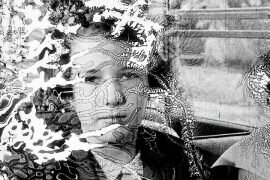The place is the Soviet War Memorial in Berlin’s Treptower Park. The day is May 9, 2017, the 72nd anniversary of the Red Army’s victory over the Nazi regime – also known as Victory Day. Sergei Loznitsa documents the day’s proceedings from beginning to end, placing his camera at strategic points to unobtrusively record the rousing crowds of hundreds who descend upon the memorial site to celebrate the day in an act of social remembering, a frightening, mind-boggling spectacle of nationalism.
Its opening shot is of a group of cadet uniformed Russian boys marching single file down a path with marked solemnity, while some of their fellow comrades do a little horsing around towards the side. It is an image that summons up the dichotomy of behavior that is transmitted by Loznitsa’s camera: a sober no-bullshit display of immense national pride countered by some serious partying, dancing, and singing. Lots of it. Yet, all of it – the military demonstrations and the carousing – strikes one as rehearsed, choreographed, staged, and soon it becomes a film of how memorial sites generate specific, indeed required, types of performance.
Loznista’s technique is similar, if not exactly the same as his previous documentary, Austerlitz (2016), wherein he documented the hordes of tourists that descend upon the two concentration camps Sachsenhausen and Dachau. Together the two films form a diptych: both show the seemingly never-ending tide of visitors as they navigate through a site, observing the way they move, interact, gesticulate, indulge in selfies, how they insert themselves into these spaces of historical trauma. Its also shot in wide screen tableaus, the camera often lingering on one scene minutes at a time, allowing the eye to freely drift from person to person, picking out details in dress, or in facial expression, some of which are just plain hilarious: one man, unlit cigarette in his mouth, visibly intoxicated wearing a tacky T-shirt of Vladimir Putin with Terminator sunglasses; or a very unhappy toddler crying in the midst of a crowd of creepily grinning adults.
At times the frame is so overwhelmed with people that it is reduced to an abstract puzzle of body parts and text, a sea of undulating color and form. Much of the work of the film for me was trying to register all the different flags, banners, buttons and signs; to decode all the bits of writing, and the widely disparate piece of costume: the anti-fascist slogans colliding with ultra nationalist Russian propaganda; the brutal black leathered metal chest plated uniforms of the Night Wolves biker gang clashing with the richly colored traditional dress of the Cossacks.
The site becomes a magnet or stage for a remarkably disparate groups of people and political factions, who no doubt under any other circumstance, wouldn’t be dead caught together: the previously mentioned Night Wolves, a highly nefarious rightwing Russian bike gang with close ties to the Kremlin, German Communists, Stalinist apologists, Russian school groups, babushkas, war veterans, the odd tourist; all in all a highly paradoxical coming together of ideological confusion, tendencies etc. each broadcasting their message to one another.
We hear scraps of audio, decontextualized pieces of conversation, speeches, impassioned rants, some very funny: one man goes on about the supremacy of Russian morality, to which an old woman quips: “My God, who stuffed your brain so full of shit?” Every once in a while Loznitsa cuts to detailed close-ups of the monument itself: we see chiseled stone women, soldiers, workers, work tools – all part of Soviet iconography – allowing us to see the memorial, which, though doubtlessly beautiful, is obscured by the crowd.
With Victory Day, Loznitsa has made a successful, compelling addition to his documentaries that explore our endlessly strange, contradictory behavior at sites of memory, how we use them as platforms for our own self-satisfied expression.




